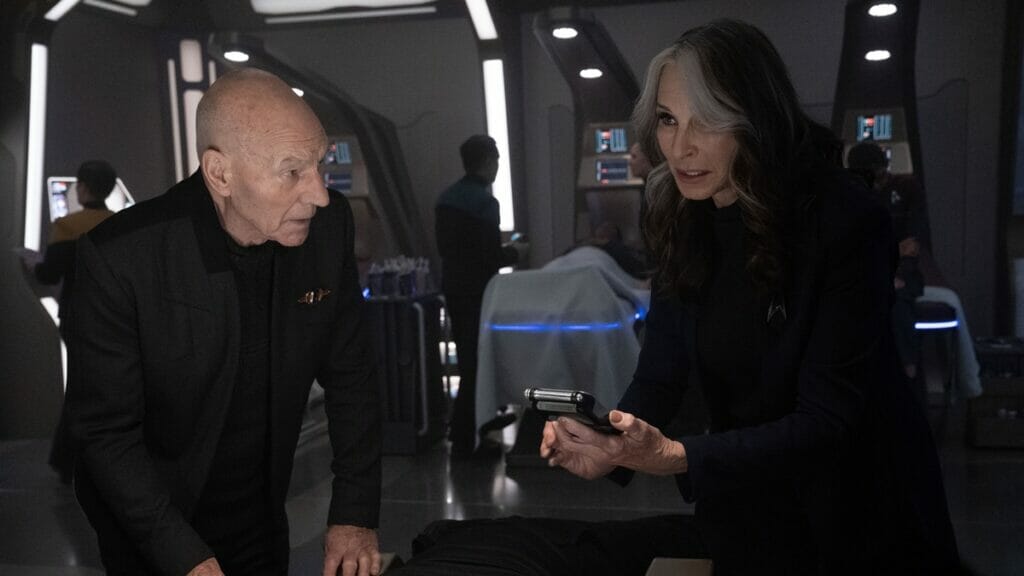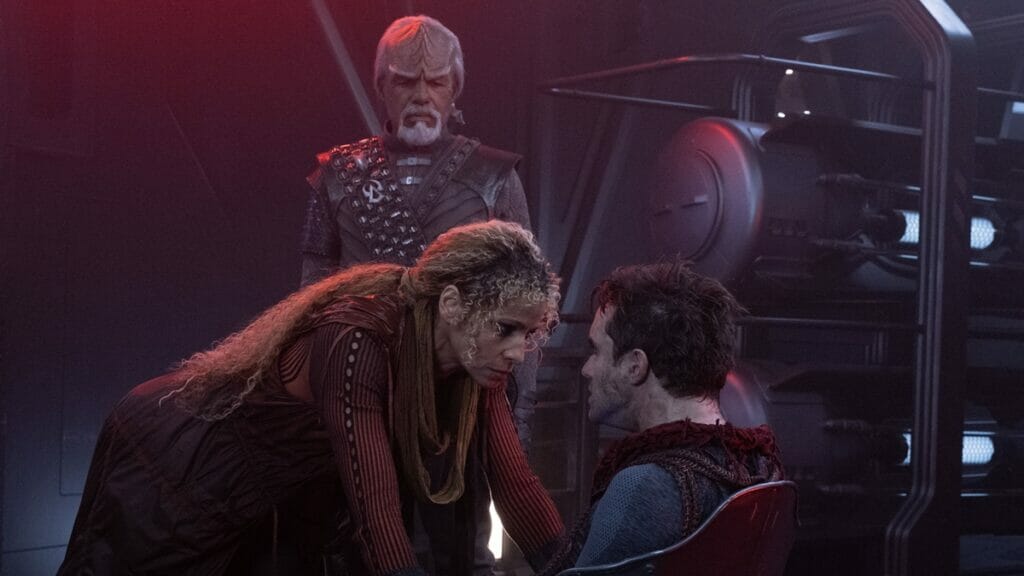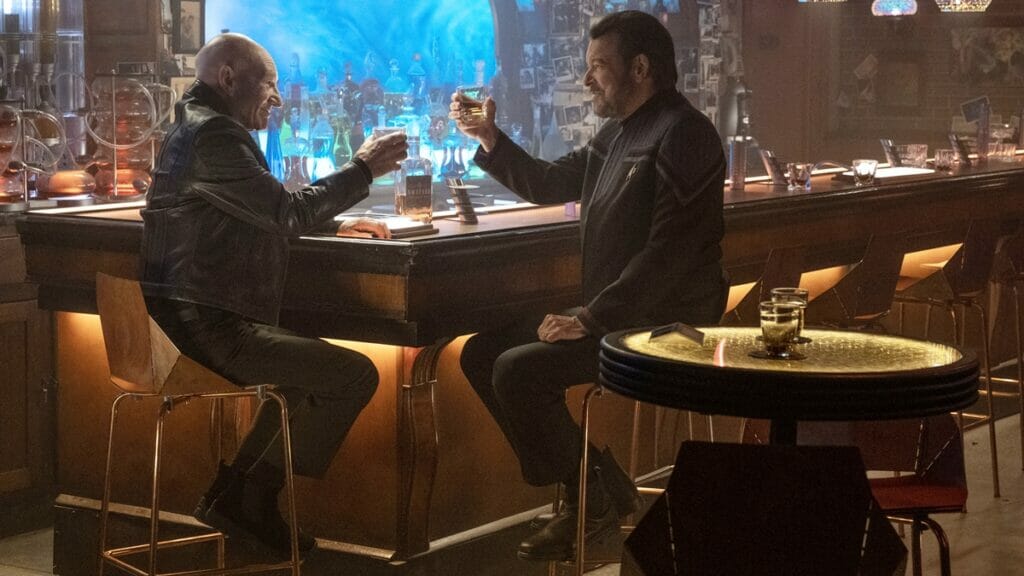“Seventeen Seconds” uses an otherwise cheap ploy to explore the life-changing nature of parenthood in one of the series’ finest hours.
The real reason Jean-Luc Picard (Patrick Stewart) and Beverly Crusher (Gates McFadden) have a secret child together is because the twist creates easy narrative fireworks. Sure, they could have simply become old friends who’d lived regular lives since they parted and occasionally kept in touch. But that wouldn’t have the drama! The conflict! The sparks flying! The choice is a cheap, clichéd, and implausible means to arrive at these theatrics.
Somehow, though, Star Trek: Picard redeems such a hacky move with the themes it vindicates through Jean-Luc’s sudden arrival into parenthood and the broader ways in which it dramatizes this otherwise hoary trope. Because having a kid changes you. It reshapes your priorities. It puts another life in your hands, one you’d sacrifice your own to protect. As The West Wing’s Toby Ziegler once put it (by way of Aaron Sorkin), “If somebody was hurting them, I’d drop napalm on Yellowstone to get them to stop…and I’ve known my kids for about forty-five minutes.”
That is the ultimate thrust of “Seventeen Seconds” — the idea that in the blink of an eye, having a child to worry about changes the complexion of all your life’s decisions. You cannot help but shudder at the thought of them in pain or, worse yet, losing them for good.

And in the throes of confession, it can also make you angry. The most redeeming part of this whole silly reveal is the charged confrontation between Jean-Luc and Beverly over why this is just now coming to light. The performers are still riveting and electric as scene partners, despite more than two decades since the characters shared the screen.
Truthfully, this is the most animated and emotive Stewart has been since Star Trek: Picard began. His Jean-Luc justifiably rails about Beverly robbing him of any choice here, about the chance to be a husband and a father he missed out on over the past two decades, about the sense of betrayal in her using his insecurities about fatherhood to deny him a chance to move past them. Picard is wounded, aggrieved, and lost in the sense that the damage done between father and son is irreparable. It brings out the best in the man who plays him.
But McFadden and Dr. Crusher are equal in fire and measure. Twenty years without a peep between them is an obvious conceit of the plot, but the writers paper over it with an understandable justification. Beverly rightly points out that being the son of Jean-Luc Picard means having a target on your back from day one. She had already lost her parents, her husband, and in a way, Wesley to the perils of gallivanting across the stars. So when things changed for her once again, she didn’t want to risk the same for Jack Jr. (Ed Speleers).
Star Trek: Picard redeems such a hacky move with the themes it vindicates through Jean-Luc’s sudden arrival into parenthood and the broader ways in which it dramatizes this otherwise hoary trope.
In effect, she uses the constant excitement fans so enjoyed on The Next Generation against Picard. Her argument rests on the notion that some high-stakes incident would befall him every week, where the people who wanted him dead weren’t afraid to hurt those he cared about to achieve their goals. The strongest defense of Dr. Crusher’s choice here rests on that same animating idea. When you have a child, protecting them becomes paramount. It makes you take steps you wouldn’t normally to save them from the worst fate you can imagine for them and you — losing them.
It is, in a strange way, what connects the main plot of the episode — which features the continued efforts of the Titan to evade Captain Vadic (Amanda Plummer) and the Shrike — with the B-story, which sees Raffi (Michelle Hurd) and Worf (Michael Dorn) getting to the bottom of who orchestrated the attack on Starfleet’s recruitment center.
The harmony between the unlikely duo is unexpected, but Worf and Raffi absolutely click. His stoic demeanor, matched with her sarcastic quips, followed by his dry retorts, works like gangbusters. However, there also seems to be a larger purpose to the pairing. Worf represents the kind of inner peace that a currently mixed-up Raffi lacks. It’s amusing, and a little corny, to see a version of Worf less consumed by honor and glory and more centered on balance and calm. But he represents another path afforded to Raffi, a walking example of how the fire can be quenched and the hurt can be tamed.

More to the point, Worf is a parent, one who was often away from his son. He’s struggled with the tug-of-war between his duties as an officer and his responsibilities as a father. It was puzzling why, exactly, the show returned to the subject of Raffi’s estranged son and her sense of becoming lost in old patterns within Starfleet in season 3. But the answer is a good one — because it brings her problems closer to Worf’s. The chance to show the son of Mogh (who earns a good laugh capping off his list of titles with an offer for chamomile tea), having grown past his troubles in similar terms, and imparting the same wisdom to Raffi, allows the characters’ paths to dovetail nicely, and hopefully points the way toward more catharsis to come.
Of course, “Seventeen Seconds” isn’t all parental recriminations and hearts-to-hearts. The story also features one hell of a dramatic reveal. The big bads who ordered the attack on Starfleet Recruiting turn out to be none other than…a breakaway sect of Changeling terrorists!
Holy hell! We’re running back to Deep Space Nine,folks! A terror campaign by shapeshifting villains opens up all sorts of narrative possibilities. And the Federation wanting to avoid reigniting the Dominion War provides a good excuse for all the secrecy. In truth, Deep Space Nine already pulled this off about as well as anyone could, but there’s still a thrill at the prospect of the TNG cast fighting DS9’s enemies, with hints that none other than Odo. Amid the committed and intimate character work here, there’s still plenty of narrative excitement.
That is the ultimate thrust of “Seventeen Seconds” — the idea that in the blink of an eye, having a child to worry about changes the complexion of all your life’s decisions.
The same is true in the A-story, where a skirmish injures Captain Shaw (Todd Stashwick), and he leaves none other than William T. Riker (Jonathan Frakes) in charge. After years of stories about Will turning down commands, seeing him finally lead from the big chair (outside of Lower Decks, of course) is a boon for longtime fans. Likewise, Picard telling his former subordinate it’s time for Riker to call him “number one” makes for a cute moment. And seeing the pair work together to fend off an enemy from the bridge of a galaxy(ish)-class starship again pushes the nostalgia buttons.
But rather than the dynamic duo working from the same page, there’s unexpected discord between them. Jean-Luc wants to stand and fight, and Riker wants to dodge and run. Their dispute makes way for more spectacle, when an attempt to go to warp permits Vadic to employ some “Now you’re thinking with portals!”-style trickery via the Shrike’s grand weapon. But the more important angle is the philosophical dispute between them.
The heavy implication is that Will stopped being so daring once he lost his son, viscerally knowing the consequences of these life-and-death decisions, which pierces him now in a way it didn’t in his heyday as a commander. The two old friends cross lines with each other as Picard all but admonishes Riker not to let that loss make him timid.

And yet, when Jack is suddenly on death’s door after a rough confrontation, and Picard is called to sickbay, he suddenly understands what Riker tried to explain in the flashback. When Thaddeus was born, the doctor called to tell Will something was wrong. The titular and harrowing seventeen seconds it took for him to reach his child tortured him with the thoughts of the worst possible outcome.
It’s a pain Jean-Luc never knew, never could know, until now. His own evanescent moment in time, which somehow stretches into ages of agony, arrives as he descends the turbolift and watches, helplessly, as the mother of his child works desperately to revive his boy. Picard still wants to fight, and the calls he’s made may yet cost them all dearly. But now, at least, he understands.
Even cheap storytelling choices can work if you take them seriously, allow them to move the hearts of our heroes, and make them live with the consequences, good and bad, of the arrival of something, and someone, who cannot help but radically change your life.
Read next: The Spool's Best New Releases
Streaming guides
The Best Live TV Streaming Services With Free Trial
The praises of live TV streaming services don’t need to be further sung. By now, we all know that compared to clunky, commitment-heavy cable, live TV is cheaper and much easier to manage. But just in case you’re still on the fence about jumping over to the other side, or if you’re just unhappy with ... The Best Live TV Streaming Services With Free Trial
How to Watch Power Book III: Raising Kanan Season 3
Season 3 of the hotly anticipated Power spin-off, Power Book III: Raising Kanan, is arriving on Starz soon, so you know what that means: it’s the ’90s again in The Southside, and we’re back with the Thomas family as they navigate the ins and outs of the criminal underworld they’re helping build. Mekai Curtis is ... How to Watch Power Book III: Raising Kanan Season 3
How to Watch Doctor Who: 60th Anniversary Specials
Ladies and gentlemen, we’re so back! To celebrate Doctor Who’s 60th anniversary, the BBC is producing a three-episode special starring none other than the Tenth/Fourteenth Doctor himself, David Tennant. And to the supreme delight of fans (that would be me, dear reader), the Doctor will be joined by old-time companion Donna Noble (Catherine Tate) and ... How to Watch Doctor Who: 60th Anniversary Specials
Which Netflix Country has Interstellar?
Maybe you’ve just seen Oppenheimer and have the strongest urge to marathon—or more fun yet, rank!—all of Christopher Nolan’s films. Or maybe you’re one of the few who haven’t seen Interstellar yet. If you are, then you should change that immediately; the dystopian epic is one of Nolan’s best, and with that incredible twist in ... Which Netflix Country has Interstellar?
Which Netflix Country Has Each Movie of The Hunger Games?
For whatever reason, The Hunger Games series isn’t available in the same countries around the world. You’ll find the first and second (aka the best) installments in Hong Kong, for instance, but not the third and fourth. It’s a frustrating dilemma, especially if you don’t even have a single entry in your region, which is ... Which Netflix Country Has Each Movie of The Hunger Games?
How to Watch ESPN With A Free Trial
One of the major concerns people have before cutting the cord is potentially losing access to live sports. But the great thing about live TV streaming services is that you never lose that access. Minus the contracts and complications of cable, these streaming services connect you to a host of live channels, including ESPN. So ... How to Watch ESPN With A Free Trial
How to Watch Paramount Network With a Free Trial
To date, Paramount Network has only two original shows on air right now: Yellowstone and Bar Rescue. The network seems to have its hands full with on-demand streaming service Paramount+, which is constantly stacked with a fresh supply of new shows. But Yellowstone and Bar Rescue are so sturdy and expansive that the network doesn’t ... How to Watch Paramount Network With a Free Trial
How to Watch WE TV With a Free Trial
Previously “Women’s Entertainment,” We TV has since rebranded to accurately reflect its name and be a more inclusive lifestyle channel. It’s home to addictive reality gems like Bold and Bougie, Bridezillas, Marriage Boot Camp, and The Untold Stories of Hip Hop. And when it’s not airing original titles, it has on syndicated shows like 9-1-1, ... How to Watch WE TV With a Free Trial
How to Watch Comedy Central With a Free Trial
It’s no coincidence that many of today’s biggest comedians found their footing on Comedy Central: the channel is a bastion of emerging comic talents. It served as a playground for people like Nathan Fielder (Fielder For You), Ilana Glazer and Abbi Jacobson (Broad City), Tim Robinson (Detroiters), and Dave Chappelle (Chappelle’s Show) before they shot ... How to Watch Comedy Central With a Free Trial
How to Watch FX With a Free Trial
You’d be hard-pressed to find a bad show airing on FX. The channel has made a name for itself as a bastion of high-brow TV, along with HBO and AMC. It’s produced shows like Atlanta, Fargo, The Americans, Archer, and more recently, Shogun. But because it’s owned by Disney, it still airs several blockbusters in ... How to Watch FX With a Free Trial
How to Watch A&E With A Free Trial
If you’re a fan of true crime and insider docu-shows like The First 48 and Court Cam, then you’re probably already familiar with A&E. The cable channel is home to other reality TV gems like Hoarders, Duck Dynasty, and Storage Wars (they’ve moved on to spin-offs like Road Wars, Customer Wars, and Prison Wars now). ... How to Watch A&E With A Free Trial